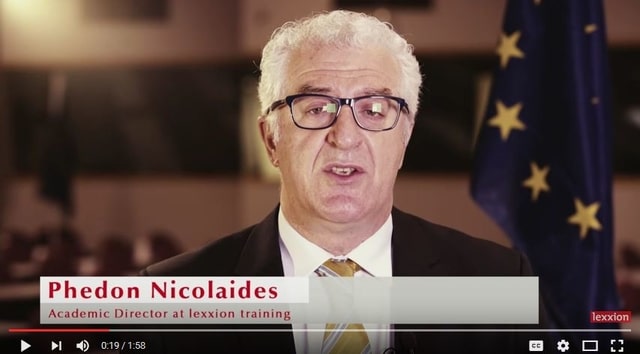What is State aid? Why do I need to be concerned about State aid? These and many more basic questions will be answered in our videos on YouTube. Make sure to visit us! Today Phedon Nicolaides answers the question “What is State aid?”, explaining the four criteria by case law & treaty. View now, comment and subscribe to our […]
State Aid Law
Blog
State Aid Uncovered Blog
In Lexxion’s State Aid Uncovered blog, Prof. Phedon Nicolaides publishes weekly critical analyses of recent State aid judgments and decisions. Each post presents the key points of a court judgment or EU Commission decision, places it in the context of similar case law or practice, assesses the underlying reasoning and highlights any inconsistencies or contradictions.
Guest contributions from other State aid experts will also be published on the blog at irregular intervals to complement the content of the blog posts.
State Aid Uncovered ×
21. June 2016 |
State Aid Uncovered
by Phedon Nicolaides
A provider of services of general economic interest may receive both investment aid and compensation for the extra costs of public service obligations. Introduction Governments normally support large infrastructural projects through guarantees. This is because such projects have a long life, the initial investment costs are very high and the recoupment of investment takes place over a long period […]
16. June 2016 |
State Aid Uncovered
by Lexxion Publisher
What is State aid? Why do I need to be concerned about State aid? These and many more basic questions will be answered in our videos on YouTube. Make sure to visit us! Today Phedon Nicolaides tells you, why public authorities should be concerned about Stateaid. Please comment and subscribe. Visit our YouTube Channel and show all videos. You […]
13. June 2016 |
State Aid Uncovered
by Phedon Nicolaides
A state guarantee is presumed to lower borrowing costs. However, any other benefits in relation to customers or suppliers have to be proven. Introduction On 26 May 2016, the General Court rendered its judgment in case T-479/11, France v Commission concerning the IFP.[1] France appealed against Commission decision 2012/26 which found that France granted aid to IFP. IFP iIFP s […]
7. June 2016 |
State Aid Uncovered
by Phedon Nicolaides
Aid measures that target persons with particular needs and who are not adequately provided by the market are not likely to be found to distort competition contrary to the common interest, even if there is some substitutability between the subsidised services and similar services provided by the market on commercial terms. Introduction In August 2011, the Commission received a […]
31. May 2016 |
State Aid Uncovered
by Phedon Nicolaides
Arrangements established by law whereby undertakings are compensated for any extra payments they make to producers of green electricity are likely to bring those payments under the control of the state. Those payments will then be classified as state resources regardless of whether they are managed by private entities. Introduction On 10 May 2016, the General Court issued its […]
24. May 2016 |
State Aid Uncovered
by Phedon Nicolaides
State aid is an objective concept. When the Commission assesses a measure it has to examine its effects and cannot be bound by a decision of the Council. A beneficiary of State aid cannot entertain legitimate expectations simply because the Commission does not appear to object to the aid. Introduction On 22 April 2016, the General Court rendered its judgment […]
18. May 2016 |
State Aid Uncovered
by Phedon Nicolaides
A market economy operator undertakes activities whose incremental revenue exceeds their incremental costs. A market economy operator ignores costs which are unaffected by those activities. A service of general economic interest has special characteristics that set it apart from other services with positive impact on the economy. Having a positive impact is not enough. Part II: Public tasks and […]
10. May 2016 |
State Aid Uncovered
by Phedon Nicolaides
A market economy operator undertakes activities whose incremental revenue exceeds their incremental costs. A market economy operator ignores costs which are unaffected by those activities. A service of general economic interest has special characteristics that set it apart from other services with positive impact on the economy. Having a positive impact is not enough. Introduction National and regional authorities […]
3. May 2016 |
State Aid Uncovered
by Phedon Nicolaides
State guarantees can be used to support loans for working capital. The amount of State aid in guarantees can be calculated to remain below the de minimis threshold of EUR 200,000. Introduction With financial instruments being very much in vogue, there is much interest in the use of guarantees and loans as a means of granting State aid. Therefore, […]
State Aid Uncovered ×
23. June 2016 |
State Aid Uncovered
by Lexxion Publisher
What is State aid? Why do I need to be concerned about State aid? These and many more basic questions will be answered in our videos on YouTube. Make sure to visit us! Today Phedon Nicolaides answers the question “What is State aid?”, explaining the four criteria by case law & treaty. View now, comment and subscribe to our […]
21. June 2016 |
State Aid Uncovered
by Phedon Nicolaides
A provider of services of general economic interest may receive both investment aid and compensation for the extra costs of public service obligations. Introduction Governments normally support large infrastructural projects through guarantees. This is because such projects have a long life, the initial investment costs are very high and the recoupment of investment takes place over a long period […]
16. June 2016 |
State Aid Uncovered
by Lexxion Publisher
What is State aid? Why do I need to be concerned about State aid? These and many more basic questions will be answered in our videos on YouTube. Make sure to visit us! Today Phedon Nicolaides tells you, why public authorities should be concerned about Stateaid. Please comment and subscribe. Visit our YouTube Channel and show all videos. You […]
13. June 2016 |
State Aid Uncovered
by Phedon Nicolaides
A state guarantee is presumed to lower borrowing costs. However, any other benefits in relation to customers or suppliers have to be proven. Introduction On 26 May 2016, the General Court rendered its judgment in case T-479/11, France v Commission concerning the IFP.[1] France appealed against Commission decision 2012/26 which found that France granted aid to IFP. IFP iIFP s […]
7. June 2016 |
State Aid Uncovered
by Phedon Nicolaides
Aid measures that target persons with particular needs and who are not adequately provided by the market are not likely to be found to distort competition contrary to the common interest, even if there is some substitutability between the subsidised services and similar services provided by the market on commercial terms. Introduction In August 2011, the Commission received a […]
31. May 2016 |
State Aid Uncovered
by Phedon Nicolaides
Arrangements established by law whereby undertakings are compensated for any extra payments they make to producers of green electricity are likely to bring those payments under the control of the state. Those payments will then be classified as state resources regardless of whether they are managed by private entities. Introduction On 10 May 2016, the General Court issued its […]
24. May 2016 |
State Aid Uncovered
by Phedon Nicolaides
State aid is an objective concept. When the Commission assesses a measure it has to examine its effects and cannot be bound by a decision of the Council. A beneficiary of State aid cannot entertain legitimate expectations simply because the Commission does not appear to object to the aid. Introduction On 22 April 2016, the General Court rendered its judgment […]
18. May 2016 |
State Aid Uncovered
by Phedon Nicolaides
A market economy operator undertakes activities whose incremental revenue exceeds their incremental costs. A market economy operator ignores costs which are unaffected by those activities. A service of general economic interest has special characteristics that set it apart from other services with positive impact on the economy. Having a positive impact is not enough. Part II: Public tasks and […]
10. May 2016 |
State Aid Uncovered
by Phedon Nicolaides
A market economy operator undertakes activities whose incremental revenue exceeds their incremental costs. A market economy operator ignores costs which are unaffected by those activities. A service of general economic interest has special characteristics that set it apart from other services with positive impact on the economy. Having a positive impact is not enough. Introduction National and regional authorities […]
3. May 2016 |
State Aid Uncovered
by Phedon Nicolaides
State guarantees can be used to support loans for working capital. The amount of State aid in guarantees can be calculated to remain below the de minimis threshold of EUR 200,000. Introduction With financial instruments being very much in vogue, there is much interest in the use of guarantees and loans as a means of granting State aid. Therefore, […]
State Aid Uncovered ×
23. June 2016 |
State Aid Uncovered
by Lexxion Publisher
What is State aid? Why do I need to be concerned about State aid? These and many more basic questions will be answered in our videos on YouTube. Make sure to visit us! Today Phedon Nicolaides answers the question “What is State aid?”, explaining the four criteria by case law & treaty. View now, comment and subscribe to our […]
21. June 2016 |
State Aid Uncovered
by Phedon Nicolaides
A provider of services of general economic interest may receive both investment aid and compensation for the extra costs of public service obligations. Introduction Governments normally support large infrastructural projects through guarantees. This is because such projects have a long life, the initial investment costs are very high and the recoupment of investment takes place over a long period […]
16. June 2016 |
State Aid Uncovered
by Lexxion Publisher
What is State aid? Why do I need to be concerned about State aid? These and many more basic questions will be answered in our videos on YouTube. Make sure to visit us! Today Phedon Nicolaides tells you, why public authorities should be concerned about Stateaid. Please comment and subscribe. Visit our YouTube Channel and show all videos. You […]
13. June 2016 |
State Aid Uncovered
by Phedon Nicolaides
A state guarantee is presumed to lower borrowing costs. However, any other benefits in relation to customers or suppliers have to be proven. Introduction On 26 May 2016, the General Court rendered its judgment in case T-479/11, France v Commission concerning the IFP.[1] France appealed against Commission decision 2012/26 which found that France granted aid to IFP. IFP iIFP s […]
7. June 2016 |
State Aid Uncovered
by Phedon Nicolaides
Aid measures that target persons with particular needs and who are not adequately provided by the market are not likely to be found to distort competition contrary to the common interest, even if there is some substitutability between the subsidised services and similar services provided by the market on commercial terms. Introduction In August 2011, the Commission received a […]
31. May 2016 |
State Aid Uncovered
by Phedon Nicolaides
Arrangements established by law whereby undertakings are compensated for any extra payments they make to producers of green electricity are likely to bring those payments under the control of the state. Those payments will then be classified as state resources regardless of whether they are managed by private entities. Introduction On 10 May 2016, the General Court issued its […]
24. May 2016 |
State Aid Uncovered
by Phedon Nicolaides
State aid is an objective concept. When the Commission assesses a measure it has to examine its effects and cannot be bound by a decision of the Council. A beneficiary of State aid cannot entertain legitimate expectations simply because the Commission does not appear to object to the aid. Introduction On 22 April 2016, the General Court rendered its judgment […]
18. May 2016 |
State Aid Uncovered
by Phedon Nicolaides
A market economy operator undertakes activities whose incremental revenue exceeds their incremental costs. A market economy operator ignores costs which are unaffected by those activities. A service of general economic interest has special characteristics that set it apart from other services with positive impact on the economy. Having a positive impact is not enough. Part II: Public tasks and […]
10. May 2016 |
State Aid Uncovered
by Phedon Nicolaides
A market economy operator undertakes activities whose incremental revenue exceeds their incremental costs. A market economy operator ignores costs which are unaffected by those activities. A service of general economic interest has special characteristics that set it apart from other services with positive impact on the economy. Having a positive impact is not enough. Introduction National and regional authorities […]
3. May 2016 |
State Aid Uncovered
by Phedon Nicolaides
State guarantees can be used to support loans for working capital. The amount of State aid in guarantees can be calculated to remain below the de minimis threshold of EUR 200,000. Introduction With financial instruments being very much in vogue, there is much interest in the use of guarantees and loans as a means of granting State aid. Therefore, […]












